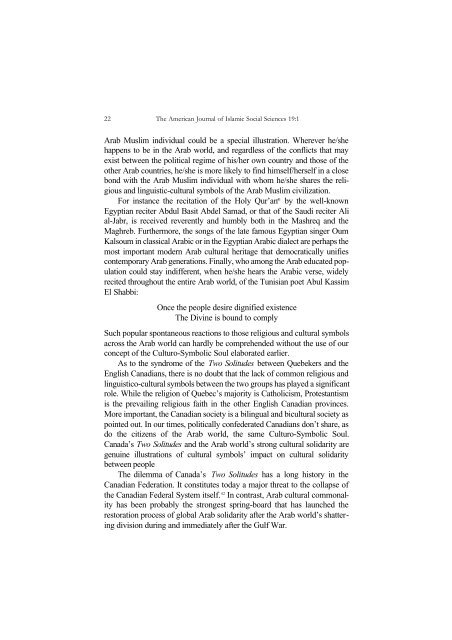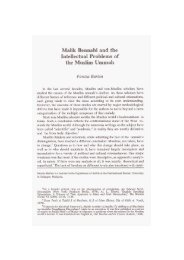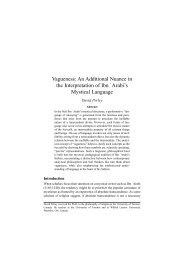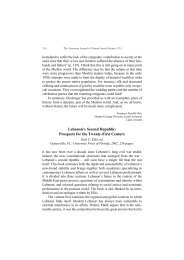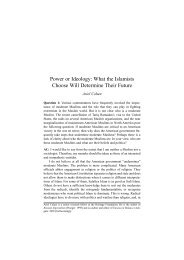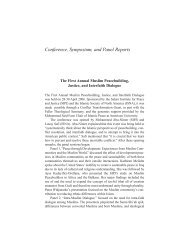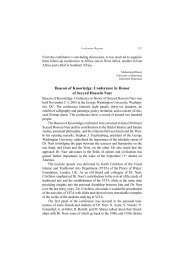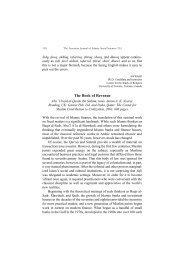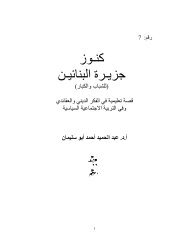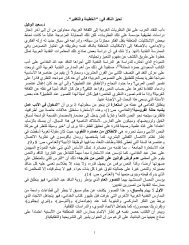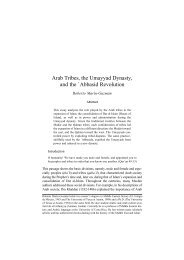Social Science's Need for a Cultural Symbols ... - Epistemology
Social Science's Need for a Cultural Symbols ... - Epistemology
Social Science's Need for a Cultural Symbols ... - Epistemology
You also want an ePaper? Increase the reach of your titles
YUMPU automatically turns print PDFs into web optimized ePapers that Google loves.
22 The American Journal of Islamic <strong>Social</strong> Sciences 19:1<br />
Arab Muslim individual could be a special illustration. Wherever he/she<br />
happens to be in the Arab world, and regardless of the conflicts that may<br />
exist between the political regime of his/her own country and those of the<br />
other Arab countries, he/she is more likely to find himself/herself in a close<br />
bond with the Arab Muslim individual with whom he/she shares the religious<br />
and linguistic-cultural symbols of the Arab Muslim civilization.<br />
For instance the recitation of the Holy Qur’an 41 by the well-known<br />
Egyptian reciter Abdul Basit Abdel Samad, or that of the Saudi reciter Ali<br />
al-Jabr, is received reverently and humbly both in the Mashreq and the<br />
Maghreb. Furthermore, the songs of the late famous Egyptian singer Oum<br />
Kalsoum in classical Arabic or in the Egyptian Arabic dialect are perhaps the<br />
most important modern Arab cultural heritage that democratically unifies<br />
contemporary Arab generations. Finally, who among the Arab educated population<br />
could stay indifferent, when he/she hears the Arabic verse, widely<br />
recited throughout the entire Arab world, of the Tunisian poet Abul Kassim<br />
El Shabbi:<br />
Once the people desire dignified existence<br />
The Divine is bound to comply<br />
Such popular spontaneous reactions to those religious and cultural symbols<br />
across the Arab world can hardly be comprehended without the use of our<br />
concept of the Culturo-Symbolic Soul elaborated earlier.<br />
As to the syndrome of the Two Solitudes between Quebekers and the<br />
English Canadians, there is no doubt that the lack of common religious and<br />
linguistico-cultural symbols between the two groups has played a significant<br />
role. While the religion of Quebec’s majority is Catholicism, Protestantism<br />
is the prevailing religious faith in the other English Canadian provinces.<br />
More important, the Canadian society is a bilingual and bicultural society as<br />
pointed out. In our times, politically confederated Canadians don’t share, as<br />
do the citizens of the Arab world, the same Culturo-Symbolic Soul.<br />
Canada’s Two Solitudes and the Arab world’s strong cultural solidarity are<br />
genuine illustrations of cultural symbols’ impact on cultural solidarity<br />
between people<br />
The dilemma of Canada’s Two Solitudes has a long history in the<br />
Canadian Federation. It constitutes today a major threat to the collapse of<br />
the Canadian Federal System itself. 42 In contrast, Arab cultural commonality<br />
has been probably the strongest spring-board that has launched the<br />
restoration process of global Arab solidarity after the Arab world’s shattering<br />
division during and immediately after the Gulf War.


